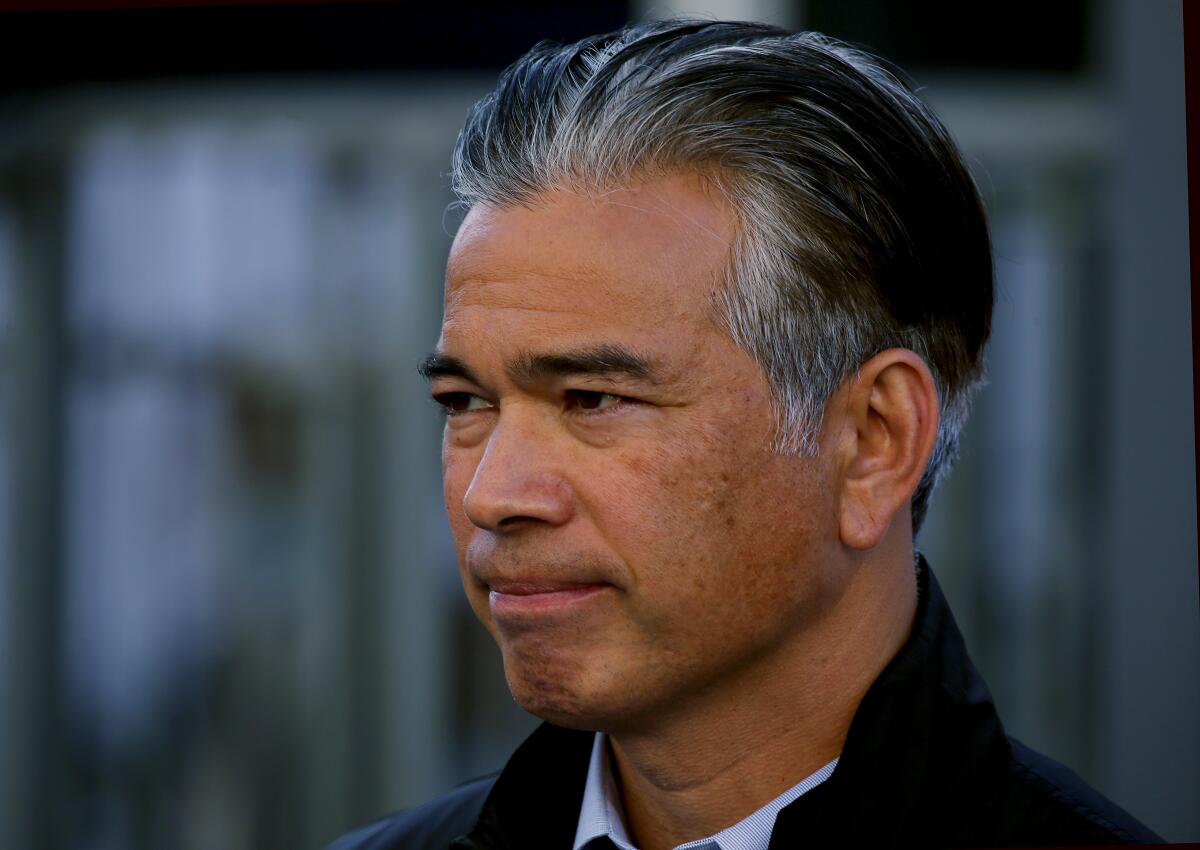California attorney general plans to investigate questionable criminal convictions

- Share via
California Atty. Gen. Rob Bonta on Friday announced his creation of a new legal team to investigate “wrongful or improper” criminal convictions from the past.
The new Post-Conviction Justice Unit, the first of its kind at the state level, will “work to support integrity in the criminal legal system and seek to remedy cases where there have been miscarriages of justice,” Bonta’s office said.
“Whether it’s as a result of bias, changes in forensics, or any other issue, our system is not foolproof, and we must make every effort to ensure the integrity of prosecutions in our state,” Bonta said.
He said the goal of the office is to “ultimately support public safety” by ensuring public trust in the criminal justice system. Its work, he said during a news conference in Oakland, will be conducted with “an eye toward systemic racism” and other injustices that have undermined that system in the past.
“We’re embracing our duty to seek justice — not to blindly seek convictions — and to make sure that convictions are just,” Bonta said.
The move is part of a broader trend of prosecutors nationwide acknowledging faults in the criminal system and their role in and responsibility for redressing miscarriages of justice.
Many local prosecutors’ offices already have such units, including the Los Angeles County district attorney’s office. Former Dist. Atty. Jackie Lacey launched that office’s unit in 2015, and current Dist. Atty. George Gascón renamed it — as the Conviction Integrity Unit — and has touted it as a critical component of his office.
The trend has in part been driven by independent groups — such as the California Innocence Project — finding repeated success in proving wrongful convictions and freeing people from prison.
Such successes have uncovered missteps and even misdeeds by prosecutors in the past, calling their integrity and the integrity of the convictions they won into question. Prosecutors have launched their own review teams to take ownership of the process and at times own up to the mistakes of their own staffs in the past.
Michael Semanchik, managing attorney for the California Innocence Project, said Friday that his group was “thrilled” with Bonta’s announcement.
The new unit will not only put more eyes on the vast number of cases that deserve review in the state, but in some instances will be able to provide more impartial reviews than local prosecutors whose offices were involved in a case’s initial handling, he said.
The attorney general’s office also will have more ready access to police records, case files and other evidence in problematic cases than private groups such as the Innocence Project and will therefore be able to spot integrity issues and injustices, and take them back into court and before judges, much faster, Semanchik said. Private organizations must file motions and relitigate cases in court if they want such access.
“Their access to all of the information certainly gives them a head start for determining whether a wrongful conviction happened,” he said. “They have the power to undo a wrongful conviction a lot swifter and easier than us having to go and litigate it.”
The California Innocence Coalition — which consists of the California Innocence Project, the Northern California Innocence Project, the Loyola Project for the Innocent and the Los Angeles Innocence Project — also praised Bonta’s announcement as a step forward, saying it hopes the new unit “will carry out the spirit of justice for the wrongfully convicted.”
Bonta said the new unit will begin by reviewing cases that his office has handled. That includes cases that were transferred to his office because a local prosecutor’s office had a conflict and cases that his office took up on appeal.
“We feel we need to start by looking at and reviewing ourselves,” he said.
Later, it will cast its gaze statewide, he said.
Bonta’s office said its new unit will work with local district attorneys to “conduct investigations and reviews aimed at resolving wrongful or improper criminal convictions, including matters where there may be evidence of significant integrity issues, and to identify cases that may be suitable for potential resentencing.”
In localities that have their own integrity units, “we want to defer to those units,” Bonta said. “We’re happy those units are there. Our unit is an extra layer of review.”
In localities without their own units, Bonta’s new team will step in to conduct any reviews it deems necessary, he said.
The state team will provide “statewide leadership” in the area, including by developing a set of best practices for such reviews and coordinating with local conviction integrity units. The new unit will be led by two deputy attorneys general, who will establish formal protocols for accepting cases for review.
Bonta said he is creating the positions using existing discretionary funds, so the new unit “requires no new budget.” The unit will start its work as soon as it is staffed and can establish clear criteria for accepting cases.
“We hope to do that as fast as possible,” he said.
More to Read
Sign up for Essential California
The most important California stories and recommendations in your inbox every morning.
You may occasionally receive promotional content from the Los Angeles Times.














